
It is a tremendous privilege to support the success and well-being of our students at the University of Tennessee, Knoxville. By focusing on the whole student and providing the critical support they need to succeed, we are transforming what it means to be a Tennessee Volunteer. At UT, students are learning to take care of themselves and how they can help support their peers. The impact of our work on the student experience and on the larger UT community is transformational.



In the coming pages, you will learn of our successes, how we have supported the well-being of students, and how we are building leaders. We are proud to share these successes that were achieved in collaboration with students, faculty, staff, and community partners.
This past year was special. We celebrated many anniversaries of spaces where our students have thrived for decades. We marked new beginnings, announcing the new Center for Care and Resilience and Community Health Team in the Student Health Center. Realizing these priorities will not only put the well-being of students first, but it also equips students with the tools they need to serve their community and grow into the leaders of our future.
We hope you enjoy our Impact Report. We are proud to share our story with you.

In the Volunteer Spirit,
 Frank Cuevas vice chancellor for Student Life
Frank Cuevas vice chancellor for Student Life
 Jill Zambito assistant vice chancellor for health and well-being
Jill Zambito assistant vice chancellor for health and well-being
4
WE CHAMPION THE WELL-BEING OF ALL VOLS.

Letter from the Vice Chancellor 2 Table of Contents 3 We Are Student Life 4 Priority 1: Transformative Experiences 6 Enhanced Focus on Students’ Leadership Development Journey 7 Standing the Test of Time: Student Life Offices Celebrate Anniversaries and the Growth of Services 8 The Room Where It Happens: How Space Transforms Experiences 10 Frieson Black Cultural Center Provides Students a Home Away from Home for 20 Years 12 It’s a Family Tradition: The Ponder Family’s Legacy of Service and Leadership at UT 14 Packing to Give Back 16 Priority 2: Culture of Care and Inclusivity 20 Developing a Sense of Belonging 21 Support the Whole Student: A Proactive Approach to the Mental Health of College Students 22 Artifacts of Home 26 Priority 3: Personal and Professional Growth 30 Enhancing the Student Employment Experience 31 The Power of Connection 34 Priority 4: Responsible and Effective Stewardship 36 A Win for Everyone: The Impact of Campus Buy-In on Student Life Initiatives 37 Community Health Team to Provide Proactive Education 40 Center for Care and Resilience Established, Oversees 974-HELP 41 Providing Students with Resources to Succeed 42 Student Life by the Numbers 44
EXECUTIVE EDITOR Meghan Jagnow ART DIRECTOR Patrick Lamb MANAGING EDITOR Beth Hall Davis Landin Lynd Alyssa Sessier SPECIAL THANKS TO Steven Bridges Melissa Brown Cecilia Demoski Noelia Pacheco Diaz Laurenz Howard Byron Hughes Susannah Marshman Chandra Myrick Anna Perry Jill Zambito University Printing & Mail The University of Tennessee is an EEO/AA/Title VI/Title IX/Section 504/ADA/ADEA institution in the provision of its education and employment programs and services. All qualified applicants will receive equal consideration for employment and admission without regard to race, color, national origin, religion, sex, pregnancy, marital status, sexual orientation, gender identity, age, physical or mental disability, genetic information, veteran status, and parental status. A project of the Division of Student Life.
TABLE OF CONTENTS


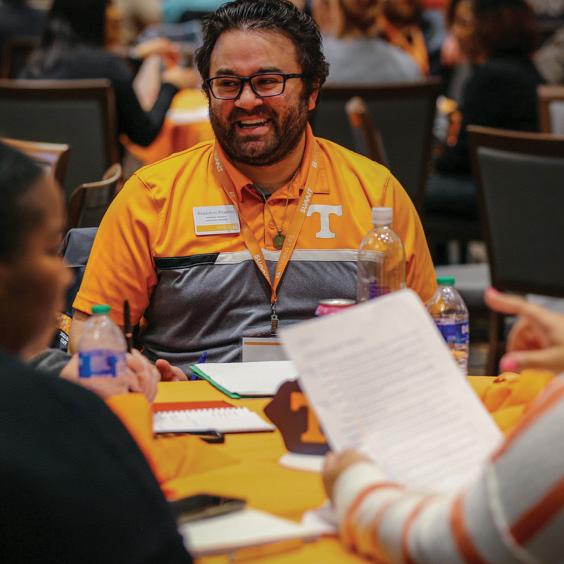

6
We create transformative opportunities for students to learn and grow outside of the classroom. We connect with community partners to engage students in service, giving back to our local and global community. We invest in physical spaces where students live and work to create a home away from home. We value personal and community well-being by providing unique opportunities to find the balance students need to be their best at UT.

We are the student advocate, the mentor that develops the emerging leader, and the support that students lean on in time of need. We cultivate the Volunteer experience every day through our programs, spaces, and resources.

WE ARE


STUDENT LIFE
7
PRIORITY 1 Transformative Experiences

Student Life provides opportunities for students to develop a sense of self by understanding their individual strengths, values, and goals, and expanding their leadership capacity. We empower students to connect with the broader community through civic engagement and enhance the overall campus experience by providing services and programs to students.

8
ENHANCED FOCUS ON STUDENTS’ LEADERSHIP DEVELOPMENT JOURNEY
 by Susannah Marshman, assistant vice chancellor for leadership and engagement
by Susannah Marshman, assistant vice chancellor for leadership and engagement


Welcome to Rocky Top and what a welcome it has been! As the first assistant vice chancellor for leadership and engagement within the Division of Student Life, I have had the pleasure over the last several months of working directly with four offices that care deeply about their work, the university, and, most importantly, the students here. They are focused on creating transformational opportunities and experiences which engage students outside the classroom and develop them into globallyminded leaders.
Being back on a large, research 1 campus with a thriving student body has given me so much energy to focus on this intentional work. As my units and the division continue to develop new programs and expand upon existing programs, we will work to meet students where they are in their leadership development journey. If a student needs to learn the basics or about their own identities, we will encourage them to get connected with programs and classes at the Jones Center for Leadership and Service, the Pride Center, Multicultural Student Life, or many other offices. For students who may already have an understanding of their identities and be ready to lead their peers, the Center for Student Engagement, the Office of Sorority and Fraternity Life, the Student Union, and others can provide them with opportunities to learn about how to effectively lead others through positions within student organizations or through student employment positions on campus.
Through engagement and leadership experiences, university administrators are able to help students see and feel that they are more than just a number; they matter and belong here. I could give you a host of student development theories that support this, but the more we invest in our students and connect with them, the more likely they will be retained and stay connected to the Volunteer family for years to come.
PRIORITY 1
9
STANDING THE TEST OF TIME: STUDENT LIFE OFFICES CELEBRATE ANNIVERSARIES AND THE GROWTH OF SERVICES
The 2022-23 academic year is a year of celebrations for many Student Life offices and programs. We marked key anniversaries, highlighting UT’s long history of programs, resources, and support offered to students. For decades, the committed staff of Multicultural Student Life, the Jones Center for Leadership and Service, and the Office of Sorority and Fraternity Life have created environments where students become leaders.

150 Years of Sorority and Fraternity Life
In September 2022, the Office of Sorority and Fraternity Life (OSFL) celebrated 150 years since its inception on our campus. Since the first fraternity was chartered on campus in 1872 1 , the university has hosted nearly 100 different local and national chapters of sororities and fraternities. Currently, there are 47 active chapters on our campus. More than 7,100 students, approximately 26% of the undergraduate population, are members of Greek-letter organizations and represent four governing councils:
Interfraternity Council (IFC), Multicultural Greek Council (MGC), National Pan-Hellenic Council (NPHC), and Panhellenic Council.
“This community has continued to provide a space for students to see themselves reflected not just in activities on campus but also to provide space to network, learn, and grow in a safe environment, and to really figure out who they are as individuals,” said OSFL director John Keith. “So for 150 years this community has been cultivating leaders. For 150 years this community has been standing on the tenants of brotherhood, sisterhood, and siblinghood. For 150 years, this community has made a big place feel small.”
“On a campus where we have more than 30,000 students, they’re able to find their home,” echoed Hunter Carlheim, assistant director for OSFL. “They’re able to find their fit in a group of people that isn’t just twenty people, or ten people, or 150 people, or 400 people. They’re joining an entire community where they know that they are valued and have emotional support when they need it.”
7,100 students are members of Greek letter organizations, accounting for total chapters
active men’s fraternities
26% of the total undergraduate population
Chapters can be seen around campus through their members, chapter banners on Pedestrian Walkway, the NPHC Monuments, Fraternity Park, and Sorority Village. Of the 47 chapters, UT has 20 active men’s fraternities, six culturally-based sororities and fraternities, eight historically Black sororities and fraternities, and 13 women’s sororities.
culturally-based sororities and fraternities 6 historically Black sororities and fraternities

active women’s sororities

47
20
8
1volopedia.lib.utk.edu/entries/alpha-tau-omega-fraternity/ 10
13
30 Years of VOLbreaks





Since 1993, hundreds of UT students participating in the Jones Center for Leadership and Service’s (JCLS) VOLbreaks have traveled around the country and the world to serve communities and gain new perspectives outside of UT. The alternative break program is an immersive community service experience that has expanded the thinking of students year after year when they think about and address serious social issues.


“The VOLbreaks program gives students the opportunity to engage in direct service in collaboration with communities around the world,” said Laura Solomon, associate director for JCLS. “Students who participate spend their fall, winter, or spring breaks learning about critical challenges facing communities, interacting with local leaders, and performing short-term projects with community agencies.
VOLbreaks (formerly Alternative Breaks) was around long before our center was created.”
Additionally, the Jones Center for Leadership and Service is celebrating the 10-year anniversary of the office. Creating a stand-alone office demonstrated the university’s commitment to leadership and service education at UT. Mandie Beeler, director of JCLS, shared that “each person has the capacity and responsibility to lead and serve in their respective communities. Leadership does not require a position or title to be influential, and we all have talents that can make us of service to others.”
The center was renamed the Jones Center for Leadership and Service in 2019 following a landmark gift of $5 million to enhance programs and initiatives offered to students.
BY THE NUMBERS
VOLBREAKS 2012-2023: 44 cities served 120
VOLbreak trips

1,500+ participants, VOLbreak leaders, and learning partners
40,000+ total service hours
PRIORITY 1
11
THE ROOM WHERE IT HAPPENS:

How Space Transforms the Student Experience

12
by Chandra Myrick, associate vice chancellor


We often create meaningful experiences for college students by hosting programs and events for them to connect with other students; personal development sessions that allow them to explore their own identities and values; and service opportunities to learn about and give back to the local community. There is no doubt the work of Student Life staff contributes significantly to the experiences that become fond memories for students while in college and long after they graduate. What is sometimes not as obvious is the impact campus spaces have on the college student experience.
While driving new students and their families around in golf carts during fall move-in, I asked many of them why they chose to attend UT. Almost all their answers centered around how students felt when they visited campus. Not only could they see themselves as Volunteers, but they could see themselves being part of the physical spaces that evoked strong desires to call Rocky Top home. Simply listening to their stories and watching the excitement in their eyes
reminded me of how much our campus spaces contribute to a sense of belonging for many of our students.
We are privileged to be keepers of many spaces on campus where students build relationships, develop life skills, and learn about themselves and others. Whether attending events in the Student Union, participating in a fitness class at TRECS, or hanging out in a residence hall lounge, our spaces make campus feel like home. While these spaces have changed (and in some instances physically moved) throughout the years, they are critical components to our students’ experiences and their fond memories of being a Volunteer.

As we continue focusing on the impact of Student Life at UT, we will take a look at past and current ways our physical spaces impact the student experience. Each impact report will feature stories about Student Life spaces, such as the Student Union, the Frieson Black Cultural Center, the Student Health Center, housing and monuments dedicated to fraternity and sorority life, TRECS, and former and current residence halls. We will explore how these spaces have led to transformative experiences for students who lead, learn, and serve within interior and exterior spaces on our campus where many proudly exclaim, “It will always be home sweet home to me.”

PRIORITY 1 13
1968


FRIESON BLACK CULTURAL CENTER PROVIDES STUDENTS A HOME AWAY FROM HOME FOR 20 YEARS
The Frieson Black Cultural Center (FBCC) is a transformational space on campus that has impacted the lives of students at UT for well over 20 years. Today, the FBCC houses critical programs, support, and resources, offering students a sense of community.
When the Black Cultural Center was first established in 1975, it focused on support and services for Black and African American students at UT. Originally located in a former residence on the campus, the center provided a place for students to gather while educating the community about the Black experience at the university.
In 2002, the campus constructed a new Black Cultural Center to replace the former residence, and the new center was the first building on campus to be built specifically for Black and African American students. In 2015, the center was renamed the Frieson Black Cultural Center after alumni Ron and Don Frieson, following a historic $1 million gift that funded additional academic

HISTORY OF THE FRIESON BLACK CULTURAL CENTER
August 1975
The idea for a center on campus is first discussed. Ralph Boston, coordinator of Minority Affairs, and members of the Black Student Union (later called Afro-American Student Liberation Force), are credited for planning and implementing the center.

support, diversity workshops, peer mentoring, and leadership development opportunities for students.
2022 marked the FBCC’s 20th anniversary at the 1800 Melrose location, and the building has served as a home away from home for thousands of students. Housing the Office of Multicultural Student Life, the FBCC supports students from all religions, cultures, languages, races, and backgrounds.
“The FBCC is a place where you can be proud of who you are and celebrate who you are,” shared Anthony Prewitt, director of Multicultural Student Life. The programs and services found in the FBCC are evolving and growing, celebrating the stories of the students that walk through their doors. At the FBCC, the sense of family, friendship, and connectedness is cultivated and amplified.
The first Black Cultural Center (BCC) on campus opens its doors.
January 18 1980
January 22 1980
BCC director Dennie Littlejohn transferred to another role on campus citing unsubstantiated differences with Dean William Byas.
Students protest the reassignment of Littlejohn and demand funding for a Black cultural program in a weekend-long sit-in at the center. An eviction notice ends the sit-in and leads to 18 students arrested for refusing to leave. The BCC is closed and boarded up following the protests. 200 students march to Andy Holt Tower and demand to see Chancellor Jack Reese.
“The FBCC is a place where you can be proud of who you are and celebrate who you are.”
—Anthony Prewitt, director, MSL
January 28 1980
The BCC reopens, and a committee is formed to aid in the operation of the center.
1982
1998
The center expands support to serve all students regardless of race, religion, and background.
A task force is formed to plan a new Black Cultural Center, and the student body votes to fund construction with student activity fees.
2015
2002

BCC opens as the first building on campus to be built specifically for Black students.

The center is renamed the Frieson Black Cultural Center (FBCC) following the historic $1 million gift by Ron and Don Frieson to support the transformational work of the center.
volopedia.lib.utk.edu/entries/student-issue-1980-transfer-of-the-black-cultural-center-director studentlife.utk.edu/multicultural/history/history-of-the-black-cultural-center

IT’S A FAMILY TRADITION: THE PONDER FAMILY’S LEGACY OF SERVICE AND LEADERSHIP AT UT
While some students might be encouraged to attend the University of Tennessee by parents who are alumni, Isabelle Ponder applied to UT because of her aunts. Attending UT wasn’t on her radar at all, but hearing her aunts’ Volunteer pride encouraged her to apply and then attend once she was accepted.

A sophomore from Georgia, Ponder works as a resident assistant (RA) in Hess Hall and is bearing the torch for a new generation of young women, much like her aunt, Terrie Ponder Watch, did in the late 1970s. Watch, a 1980 alumna, served UT as an RA in Hess Hall and still recalls her time there fondly.

“When we get together around the holidays, my aunt Terrie and I always talk about life at UT and
share funny stories of being an RA,” says Ponder. “She loved her time at UT, and I have loved being an RA, too. It’s fun to share about facility challenges or unique situations that RAs experience with someone who understands.”
Jerry Adams, the director of residence life for University Housing at UT, notes that family ties are a common thread in those who work for housing as RAs.
“Each year, we tend to see multiple sets of siblings working as RAs or students whose older brothers or sisters served as RAs in prior years,” says Adams. “This is my thirty-fifth year serving in University Housing, and we always see
16
Above: Isabelle Ponder works the front desk of Hess Hall as an RA, the same residence hall where her aunt, Terrie Ponder Watch served residents nearly four decades prior. Right: Terri Ponder
students serving as RAs who want to help others. They put others before themselves. It takes a Volunteer to serve as an RA.”
Ponder, who is double majoring in psychology and sociology, was a resident in Hess Hall her freshman year and hopes to work as an RA for three years total, from sophomore year until she graduates.
Hess Hall is the largest residence hall on campus, housing 1,084 students. Despite its size, Ponder notes that “Hess definitely feels like home to me, and my aunt Terrie described experiencing that same homey feeling.”

The Ponder family legacy of service and leadership as RAs at UT now spans over 40 years in Hess Hall, their home away from home.
2022-2023

BY THE NUMBERS
8,400+ campus population
190 resident assistants
44 average residents per RA
“It takes a Volunteer to serve as an RA.”
—Jerry
director, Residence Life

PRIORITY 1
17
Adams,
PACKING TO GIVE BACK

18
STUDENTS, FACULTY, STAFF PACKAGE MORE THAN 49,000 MEALS FOR THE COMMUNITY
During national Hunger and Homelessness Awareness Week, 350 volunteers comprised of students, faculty, and staff packaged 49,680 non-perishable meals for the local community and UT. This is the first time Student Life and the Office of the Dean of Students have hosted a volunteer event for Hunger and Homelessness Awareness Week. The meals consisted of a 6-serving size bag of macaroni and cheese, fortified with soy, protein, and vitamins.
Ciara Gazaway, the coordinator for inclusive excellence in the Office of the Dean of Students,

BY THE NUMBERS:
49,000+ total meals packaged
32,000+ meals to the Big Orange Pantry
5,000 meals to Second Harvest Food Bank of East Tennessee
5,000 meals to Knox Pride & Positively Living
4,000 meals to Love Kitchen
2,500 meals to Pellissippi Pantry
300 meals to Smokey’s Pantry
explained that the decision to alter the approach to the week came from a distinct call from Student Life leadership to provide a more expansive service opportunity that directly influenced the campus and local community. That’s how she connected with Meals of Hope, a nonprofit meal packaging company.

“The main reason we selected Meals of Hope is that their goal is to allow the organization to decide where the meals go and where they’re distributed,” said Gazaway. “We knew the meals we were packaging would be benefiting our community.”
!While packaging meals, volunteers had the opportunity to learn more about food insecurity statistics related to college students and the state of Tennessee. This allowed them to engage in conversations and have an increased understanding of how basic needs concerns affect our community.
“The Pack to Give Back event was a great opportunity for faculty, staff, and students to come together and learn more about the hardships faced by our very own Volunteer community,” said Blake Weiss, program director of basic needs in the Office of the Dean of Students. “While the focus of the event was packing meals, the impact extends far beyond providing food. There is immense value in raising awareness around food insecurity on college campuses so we can advocate for reducing barriers to essential support. The Big Orange Pantry received meals but the campus community received the opportunity to engage with the realities of many of our faculty, staff, and students – I hope the event inspired action long after the engagement.”
PRIORITY 1
19
Continued Basic Needs Service for Our Community
The impact of large-scale volunteering events such as Pack to Give Back can make a difference both on and off campus. Service events also continue to strengthen our connection to each other. One volunteer from the event explained, “ I genuinely had

process, I had the opportunity to get to know my fellow Volunteers who were from various parts and served various roles on campus. Overall, it was a cool experience and went towards a cause that is very important to me, so I had a great time.”
Gazaway and Weiss both explained how important it is to continue to engage in service in order to make a
20
whether that be campus or beyond.”
difference in our community. When asked how the UT community can continue to make an impact on and off campus, Weiss encouraged people to “continue engaging in service around basic needs security, both on and off campus. Basic needs are essential to the well-being of all communities and engaging in service allows us to learn more about the root causes of these inequalities and potential solutions for increasing basic needs security in your community – whether that be campus or beyond.”
About the Big Orange Pantry
The Big Orange Pantry has been serving the UT community since the fall of 2020 and provides students, faculty, and staff with essentials such as food, toiletries, hygiene products, and more. The pantry allows people seeking food assistance to choose for themselves what products they receive.

Individuals who want to continue to volunteer for the Big Orange Pantry can find weekly service opportunities through ServeUTK, the university’s service calendar.
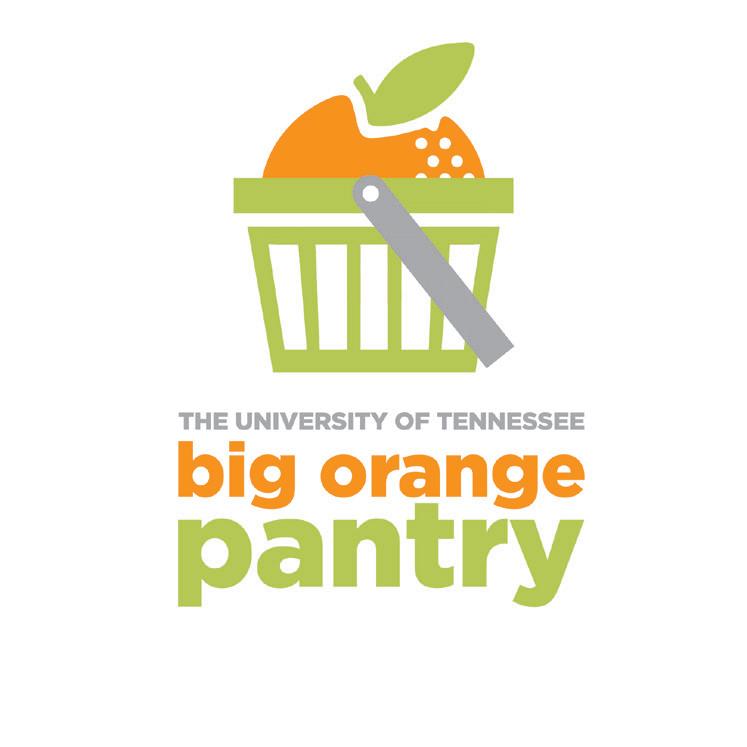
Since its launch in July 2022, ServeUTK has engaged more than 8,000 unique users and provided more than 15,000 service opportunities for our campus.


“Basic needs are essential to the well-being of all communities and engaging in service allows us to learn more about the root causes of these inequalities and potential solutions for increasing basic needs security in your community –
PRIORITY 1
— Blake Weiss, program director, Basic Needs
21
PRIORITY
2 Culture of Inclusivity and Care

The Division of Student Life cultivates inclusive education, programming, and services. We develop and implement care and support initiatives that foster success and well-being.

22
DEVELOPING A SENSE OF BELONGING

 by Byron Hughes, assistant vice chancellor and dean of students
by Byron Hughes, assistant vice chancellor and dean of students

I have often shared that I believe, as Peter Block writes, “The small group is the unit of transformation and the container for the experience of belonging.” My sense of community, care, and belonging has always been rooted in this belief. I have been fortunate to serve in several types of roles that have allowed me to place significant focus on relationships with students and colleagues where we could co-create experiences where people can thrive and flourish.
My two decades of higher education leadership have been in large communities like UT where affinity to a central identity (like being a Vol) is strong and pervasive. One of the clearest observations I’ve had though is that meaningful belonging doesn’t occur in large gatherings where students wear orange and sing “Rocky Top”. Yes, these community spaces heighten our sense of excitement and love of UT. However, it is within smaller circles of enduring friendship where a student determines whether they matter and belong. In these places, they can dive deeply into diverse understandings of themselves and others. In these places, they are invited to agree, disagree, and commit to shared values. In these places, they can build courage to transform the larger community for the benefit of all. And, in these places, they more fully realize that their talents are meant for the service of others.
The dean of students plays a critical role in visioning, leading, and convening for the purpose of co-creating the structures and framework that facilitate these types of places. For me, this starts with the understanding that a culture of care is driven by a disposition of doing whatever it takes to ensure the success and well-being of each student. A culture of this type is challenging in large communities that are not intimate by design. As such, in every step taken we must place the student experience at the center of our work. We all serve as educators toward these ends. Breaking down this large community and examining belonging at the small group level is key for determining where thriving and flourishing exists, or does not exist.
PRIORITY 2
23
SUPPORT THE WHOLE STUDENT: A PROACTIVE APPROACH TO THE MENTAL HEALTH OF COLLEGE STUDENTS
The mental health and well-being of college students has been a top trending topic for years, with students, faculty, staff, and families asking the same question of their college administrators: “What are you doing to support our student’s mental health?” The health- and wellness-focused departments within the Division of Student Life use a proactive approach to helping students deal with the stress and anxiety that can come along with being a college student.
Through partnerships between Student Life departments across campus, the Center for Health Education and Wellness, RecSports, the Student Health Center, the Center for Care and Resilience, and the Student Counseling Center work together to offer support services for students. Aside from the traditional services provided by the Student Counseling Center, each well-being office leads new initiatives and partnerships in order to support a student’s whole self from a mental health perspective.
UT Achieves JED Campus Alumni Status

UT recently received alumni status from JED Campus, a nonprofit organization that protects emotional health and prevents suicide for teens and young adults. The university partnered with JED Campus in the spring of 2018 in order to identify important areas of action for the university to support mental health, substance abuse, and suicide prevention efforts.
Some of the 14 areas for action include supporting life skills education to help students cope with the stress of university life; providing training to campus community members to identify, reach out to, and refer students at risk; and implementing means restriction activities on campus.
The Healthy Minds study is an annual webbased survey study examining mental health, service utilization, and related issues among undergraduate and graduate students. Based on the review of pre- and post-survey data, a greater percentage of students are reaching out to campus professionals for mental health support, including clinicians, faculty, and academic personnel, and to informal supports, such as family. More students report feeling confident in helping someone with a mental health problem and a greater percentage agree that students are working to promote mental health on campus.
Proactive Partnerships
Collaborations help departments offer unique and engaging programs that reach students in every corner of campus. The partnerships allow for more inclusion in events and for students to form more connections, leading to a better experience during their time at UT. Student Life’s wellness department staff continues to

24
division and campus to help students before they experience a mental health challenge.

The Center for Health Education and Wellness, the Student Counseling Center, RecSports, and several other departments within the university hosted Fresh Check Day, a mental health promotion and suicide prevention event that visits colleges around the nation to encourage and engage students in a dialogue about mental health.
All health- and wellness-related offices within Student Life, and many offices and student organizations outside of Student Life, participate in Wellness Wednesdays programs, weekly events crafted to support the needs of current students, whether that means disconnecting for relaxation and reflection or learning how

to manage stressful situations such as finals or graduation. Past programs have included meditation practices, yoga, group walks, wellness fairs, and a harvest market.
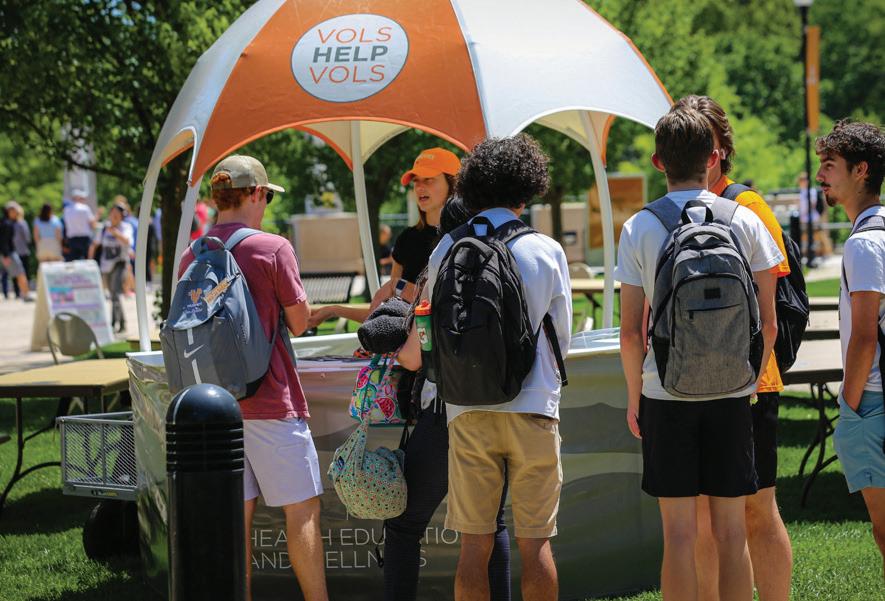
The staff in the Center for Care and Resilience, established in the summer of 2022 to oversee 974-HELP referrals, work diligently to create partnerships with offices within Student Life and beyond. The main role of the office is to help students connect with helpful campus and community resources and build plans that support self-advocacy and growth.
Creating and nurturing strong partnerships with each other is how these offices stay on top of the health of our campus, especially the mental health of our students. These offices consistently find new ways to work together to support each other and collaborate for events, programming, and training.
PRIORITY 2 wellness 25
Screenings at the Student Health Center
The staff in the Student Health Center provide depression and anxiety screenings when students have appointments with the center, specifically the Patient Health Questionnaire-2 (PHQ-2). This two-question screening gauges a student’s mental state as it relates to depression. The PHQ-2 questions are assigned points, zero to three, and then added together to provide a total score, ranging from zero to six. If a person is above a total score of three, they are then screened using Patient Health Questionnaire-9 (PHQ-9) to gauge the severity of the depression. These scores allow Student Health Center staff to see a fuller picture of the student’s health, in addition to the main reason for the visit. Based on the scores of the student’s PHQ-2 and PHQ-9, the Student Health Center is able to help connect students to campus resources such as the Student Counseling Center or the Center for Care and Resilience.
Training for the Campus Community

Several health offices within Student Life offer training sessions on different topics that the campus community can request. These sessions dive deeper into information about a variety of health topics, signs to look for in students, and how people outside of the wellness offices can help students.
The Center for Health Education and Wellness offers a Welcome to Mental Wellness program that serves as an introduction to general mental health education. This 50-minute, student-facing program incorporates the science behind mental health, coping mechanisms, techniques, and resources. Additionally, the Center for Health Education and Wellness hosts many resources for students on managing stress and warning signs
of an overloaded student.
The Student Counseling Center staff also presents lectures, workshops, and programs to groups, organizations, or classes on a wide variety of mental health topics. One of the presentations available is QPR: Question, Persuade, Refer. QPR is a nationally-acclaimed program that helps students, staff, and faculty understand the warning signs of students in distress and how to effectively intervene. Other topics include conflict resolution, signs and treatment of depression, dealing with anger, and many others.
974-HELP
Students, faculty, and staff members are encouraged to refer students who may be in distress or could benefit from extra support to the Center for Care and Resilience either by calling 865-974-HELP (4357) or completing a referral form online.
During regular business hours (Monday through Friday, 9 a.m.–5 p.m.), 974-HELP calls are answered by a member of the Center for Care and Resilience team. After hours and on weekends and holidays, calls are answered by a mental health professional who will connect callers to appropriate/immediate resources and provide a referral to the Care and Resilience team to follow up on the next business day.

26


PRIORITY 2 27

28
ARTIFACTS of HOME

“Home Sweet Home to Me”
University of Tennessee fans sing this lyric over and over again at sporting events all year round, and many students find their home on Rocky Top in a myriad of ways. But other students may have a more difficult time singing the unofficial fight song if they experience homelessness or bullying. This past spring, UT students, faculty, staff, and other students in the Knoxville community had a chance to explore the concept of home and of their connections to home, both positive and negative, through a series of workshops, made possible by new grant funds available through UT’s Pride Center thanks to generous donor contributions.
The “Creating Artifacts of Home” workshop series encourages participants to explore the concept of home and join in conversations with others about their own connections to home. Participants are given a piece of wax that they mold into an object that signifies home to them. Participants can share about their symbolic artifact, why it reminds them of home, and other aspects of their relationship to home.
“I created a dumpling both because I was hungry at the time, but also because dumplings remind me of home. It has been hard to find authentic Vietnamese food in Tennessee, and when I find a restaurant with good food, I can let my guard down, relax, and feel like I’ll be taken care of, even if it’s just for one meal.”
– Vietnamese American sophomore, studying history


PRIORITY 2
29
To protect the privacy of students associated with the Pride Center, self-reported identifying information is listed instead of student names.
As an artist and activist, Ronda Wright has been conducting the workshops for a few years across the US and started them in response to the overwhelming rate of LGBTQ+ homelessness, bullying, and suicide. The premise of the workshops is that everyone has a relation to home and that iron is an element necessary to sustain life. Wright, who is also an alumna of UT’s School of Art, drew from her own personal experiences to develop the workshop premise.
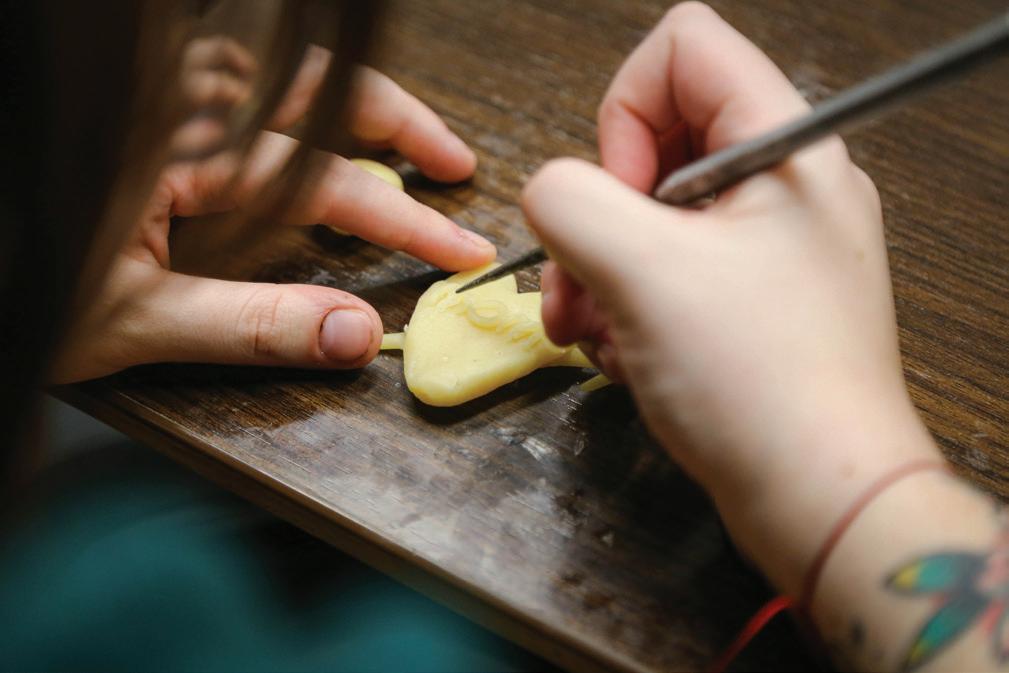
“During the workshops, participants are actively engaged in storytelling regarding how they look at home and the relationship they have to home,” says Wright. “Hearing unique perspectives from one another about this connection that we all have in common connects people to one another.”
Wright is an academic and professional development advisor and adjunct assistant professor for UT’s College of Architecture and Design. Together with Kay Dartt, another metal sculptor, artist, and professor at Shepherd University, Wright completed the iron melting and casting process in the UT Gardens, Knoxville, to create the metal artifacts from the wax molds.

After being cast in iron, the artifact becomes part of the larger collection of memories from earlier workshops. The artifacts created are then attached to a skeletal frame house. In Knoxville, this house was displayed for several weeks at UT’s Downtown Gallery. Alongside the tokens, cards with the creators’ thumbprints and their stories were also displayed. Notecards written by workshop participants about their artifact are also displayed alongside the frame house. The notecards include each participant’s thumbprint as well.
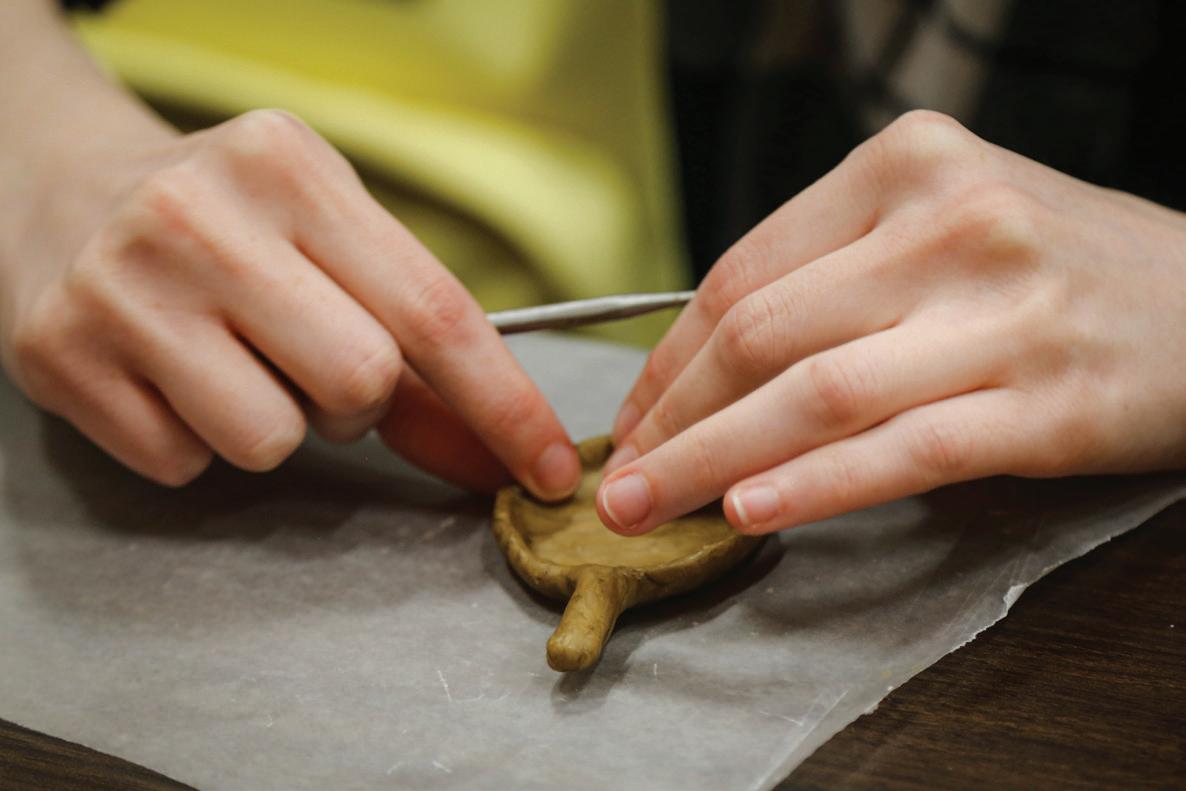
“When I think of home, my thought process leads me to family. Family to me is seen in the jewelry I wear and the story in each piece. Like the ring my parents gave me when I turned 18. It belonged to my birth mother prior to her passing when I was young. I had it remade with her ashes so she would always be with me. I know she would have held me tight and told me she loved me no matter what when I came out as bisexual. My mom has now done the same. My wax sculpture of home was my ring, because I wanted to tell that story.”
– Black freshman, studying political science

30
The 6-foot by 6-foot by 10-foot skeletal frame house becomes an interactive exhibit, where visitors can pick up the iron tokens, hold them, and then place them back on the frame. The tactile experience grounds visitors to the concept of home and iron, which is essential to sustain life. Overall, Creating Artifacts of Home workshops have been conducted in 20 states with more than 1500 participants. And the exhibition has been shown in New York, Alabama, Illinois, Iowa, Minnesota, North Carolina, and now in Tennessee.


With additional support from UT’s School of Art, Creating Artifacts of Home was the first program funded through the Pride Center’s new program funds. Bonnie Johnson, director of the Pride Center, hopes it is just the first in a legacy of programming that sparks change at UT, invites students to approach intersectionality, and lights the way for students, faculty, staff, and community members to become allies.
“Participating was very impactful,” says Miranda Lough, Pride Center graduate assistant and a second year master’s student in the College Student Personnel program. “I was able to listen to the stories of other students, the stories of other queer people, and feel a sense of community. It made me reflect on how considering one’s relationship to home will help me better support students who may not go back to a place where they feel affirmed and safe.”
Johnson says program mini-grants of up to $2,000 each will be awarded for the 2023-2024 fiscal year to support programs, events, or other initiatives that focus on gender identity, sexuality, the LGBTQ+ community, student support, or other related topics.
Johnson adds, “Throughout the Artifacts of Home program workshops, participants shared their experiences and reflections of home. Developing impactful programming for the LGBTQ+ community on campus like this one is now more achievable thanks to these funds.”
31
PRIORITY 3

Personal and Professional Growth
The Division of Student Life advances the personal and professional growth of students and staff through exploration and innovation.

32
ENHANCING THE STUDENT EMPLOYMENT EXPERIENCE
Many offices within Student Life employ student workers in roles such as front desk workers, interns, personal trainers, peer mentors, and more. In total, Student Life employs more than 1,700 undergraduate and graduate students across the division. Several Student Life offices see this as an opportunity to create a student employment experience that teaches students transferable skills they can use in their future careers.
1,700 students employed by Student Life offices
The Student Union employs approximately 100 students throughout the year to serve in a variety of functional areas: information desk and administrative office, Central Ticket Office, Union Station Recreation, loading dock, tech team and set up team, and as building managers. When students first join the Student Union staff, no matter the functional area, they attend an all-hands training where they are taught policies of the department and facility, in addition to getting to know the professional staff and each other.
“At


Similarly to the Student Union, RecSports also employs an average of 300-350 students as group fitness class instructors, outdoor trip leaders, front desk workers, lifeguards, office assistants, and graduate assistants. They, too, receive a kick-off training event at the beginning of the year where they discuss topics such as policies and customer service, but also dive into diversity topics, ADA requirements, and gender in the workplace.
—Jon Janis, assistant director, RecSports
“Additionally, RecSports requires each new student employee when hired to attend an hour-long employee orientation that introduces them to the Division of Student Life, each program area of RecSports, and general workplace expectations,” said Jon Janis, assistant director for RecSports. “This helps students understand the broad and meaningful impact RecSports has across the campus community along with their own future work experience.”
Janis and Alison Ward, associate director for the Student Union, both emphasized the importance of student works in the day-to-day functions of their facilities.
“We rely on our student staff,” said Janis. “They are our frontline employees dealing with fellow students. The more they understand the importance of the work they are doing, the better they can help serve their fellow students.”
PRIORITY 3
a university, we are a place of learning. We want to help them build out students’ foundations for their next careers by providing them with transferable skills.”
33
PREPARING STUDENTS FOR WORK AFTER COLLEGE
Both the Student Union and RecSports utilize different training and learning outcomes to best provide their student employees with the knowledge and skills needed for future careers. Over the years, many student employees in these offices have attributed their first or next career steps to the skills they gained.
For several years, both offices utilized National Association of Colleges and Employers (NACE) Competencies, eight career readiness competencies that focus on providing students with skills that are key to ensuring college students are better prepared for their careers.

Previous student employees have noted the skills gained through their work in the department helped them succeed in their professional roles. An intramural manager also explained, “My leadership experiences as
NACE COMPETENCIES

an intramural manager were invaluable to my post-graduate opportunities. I was able to learn how to direct and organize people, develop strong time management skills, take on real responsibility where I was the point person on projects, and develop strong interpersonal skills. Working with a multitude of people in a leadership role prepared me for my first job out of college. It also provided experiences that I used in my formal interview process for graduate school.”
“At a university, we are a place of learning,” said Janis. “We want to help them build out students’ foundations for their next careers by providing them with transferable skills.”
The Student Union offers a few programs to help their student employees gain skills and knowledge that prepare them for careers after college. Training and development activities include resume-building workshops, communications development and conflict
www.naceweb.org 34
management sessions, and financial wellness training.
“We want them to understand that it is more than just a job to pass the time,” said Ward. “We want to help them see that what they do here is applicable later. Providing these opportunities and building those connections is paramount to their success.”
The Student Union sees a high amount of engagements with their professional development programs from their manager level employees, student building managers. The managers spend several weeks job shadowing other staff to better understand the importance of their role. Ward notes that several building


managers have remarked that not only do they have their careers, but have succeeded in them due to the knowledge they gained during their employment with the Student Union.

“I’ve had several students come back or reach out to me after they’ve graduated and tell me that their experience working here has made them who they are today,” said Ward.
Student managers are taught to use their voice, both to their fellow students and with faculty and professional staff. They are provided a boost of support to build their confidence to better succeed in their role as a manager and student leader.
Student Union Building Manager Wins ACUI Outstanding Undergraduate Student Leader Award

Brooklyn Barnes, a senior kinesiology and neuroscience major and student building manager in the Student Union, was recently awarded the Outstanding Undergraduate Student Leader award by the Association of College Unions International. This award is given to an undergraduate student who has shown a dedicated work ethic in the student union/student activities field. As the recipient, Brooklyn has demonstrated significant contributions to campus and has served as a role model for fellow peers and students.
“I became a building manager about six months after I started working in the Union, and in this role I finally found my place on campus,” said Barnes. “As a manager, I have been able to serve students, faculty and staff, and visitors, as well as build relationships with other departments within the building. I have had the opportunity to build the confidence to speak up for myself and my peers, which I have taken and used in my extracurricular involvement on and off campus. Overall, working at the Student Union has given me the chance to grow as a person and a leader, and I am truly grateful that my coworkers and the professional staff have been so supportive in this process.”
Her nominator, a fellow Student Union student employee, wrote in her nomination of Barnes “She is the kind of leader that myself and many others strive to be.”
PRIORITY 3
35
THE POWER OF CONNECTION
by Anna Perry, Title IX Investigator, Student Conduct and Community Standards


As an undergraduate student, every aspect of college life can be intimidating–moving to a new place, finding friends, or even locating a class can seem like a daunting, impossible task. My story begins in the residence halls, where I first found my connection to campus. This connection came in the form of a professional in Student Life believing in my ability to connect with fellow students– I became a resident assistant (RA). As an RA, I made connections with my peers who were taking chances on themselves, making leaps and bounds in arenas that I had never explored. It was through my connection with the residents that I found a sense of hope–hope for their future and, in turn, my own. Once I graduated, I wanted to continue that connection I so enjoyed during my undergraduate career, and that very passion led me back to residence life to become an assistant hall director (AHD).
As an AHD, I sat with students through their highs and lows. I learned that connection can be found in many ways; connecting may be celebrating their recent success or sitting with them as they endure tough moments. It has always been that every connection has driven my passion for student affairs–seeing a student make a new friend, join a club, or even find the building their class is in, right in time. It’s the power of connection, as simple or as complex as it may be, that keeps my heart in the work. By connecting with students and professionals, I have been able to expand my knowledge by learning from the stories and experiences of others. I am now one year into my first full-time position, and I feel so fortunate to have colleagues and friends across the university that are always willing to be there for support, guidance, and, above all, connection.
36


PRIORITY 3 37
PRIORITY 4

Responsible and Effective Stewardship
The Division of Student Life responsibly and creatively stewards university resources to maximize the student experience and subsequent student learning. We empower and sustain a culture of collaboration, adaptability, and innovation.

38
A WIN FOR EVERYONE: THE IMPACT OF CAMPUS BUY-IN ON STUDENT LIFE INITIATIVES

The Division of Student Life regularly organizes and executes large-scale initiatives and events throughout the school year. In 2022, University Housing and the Center for Student Engagement made the decision to seek assistance from outside of the division to make sure that events had as much campus involvement as possible.
Move-in and Homecoming are two significant events that have always lived within Student Life but impact most students at the university, including all first-year students. Because of the large footprint of each of these events, they become opportunities for the rest of campus to connect with students.
Move -In
For many years, move-in for on-campus residents looked the same, until University Housing implemented a transformational process change in 2020. In order to safely move in residents while maintaining social distancing, an appointment-style process was implemented, making the day as easy and as safe as possible for new students.

“After implementing the appointment process, University Housing received overwhelmingly positive feedback about how much smoother move-in was for students and their families,” said Chandra Myrick, associate vice chancellor for Student Life. “The appointment process greatly reduced traffic on campus and gave staff the opportunity to provide more attention and support to students moving into the residence halls in smaller batches over a period of time.”
Additionally, University Housing staff participated in a campus task force this fall to promote a coordinated effort to enhance move-in and the first weeks of classes. This task force included staff from Student Life, Enrollment Management, Student Success, Business Services, UT Police Department, and the Provost’s Office.
“This task force evaluated how we were welcoming students and families to campus and created a more collaborative approach,” said Myrick. “The campus task force allowed us to create partnerships and build champions.”
In addition to the task force, University Housing also utilized more student, faculty, and staff volunteers as well as a third-party move-in company. Mass communications were distributed across campus to invite volunteers to welcome students and families to the city of Knoxville and the state of Tennessee for those coming from other states. Volunteers worked at the information tents, helped unload cars, and drove families back to residence halls in golf carts after they parked their vehicles. In total, movein saw 70 faculty and staff volunteers from across campus, including senior administrators from the Chancellor’s cabinet.
PRIORITY 4
39
“Overall, the positive feedback we received about the move-in process from students, families, and our campus partners was largely due to more involvement from the campus community,” said Myrick. “I had a family reach out to me directly after move-in and tell me how happy they were with the experience. We also had faculty members in different colleges reach out about wanting to get their department involved next year for move-
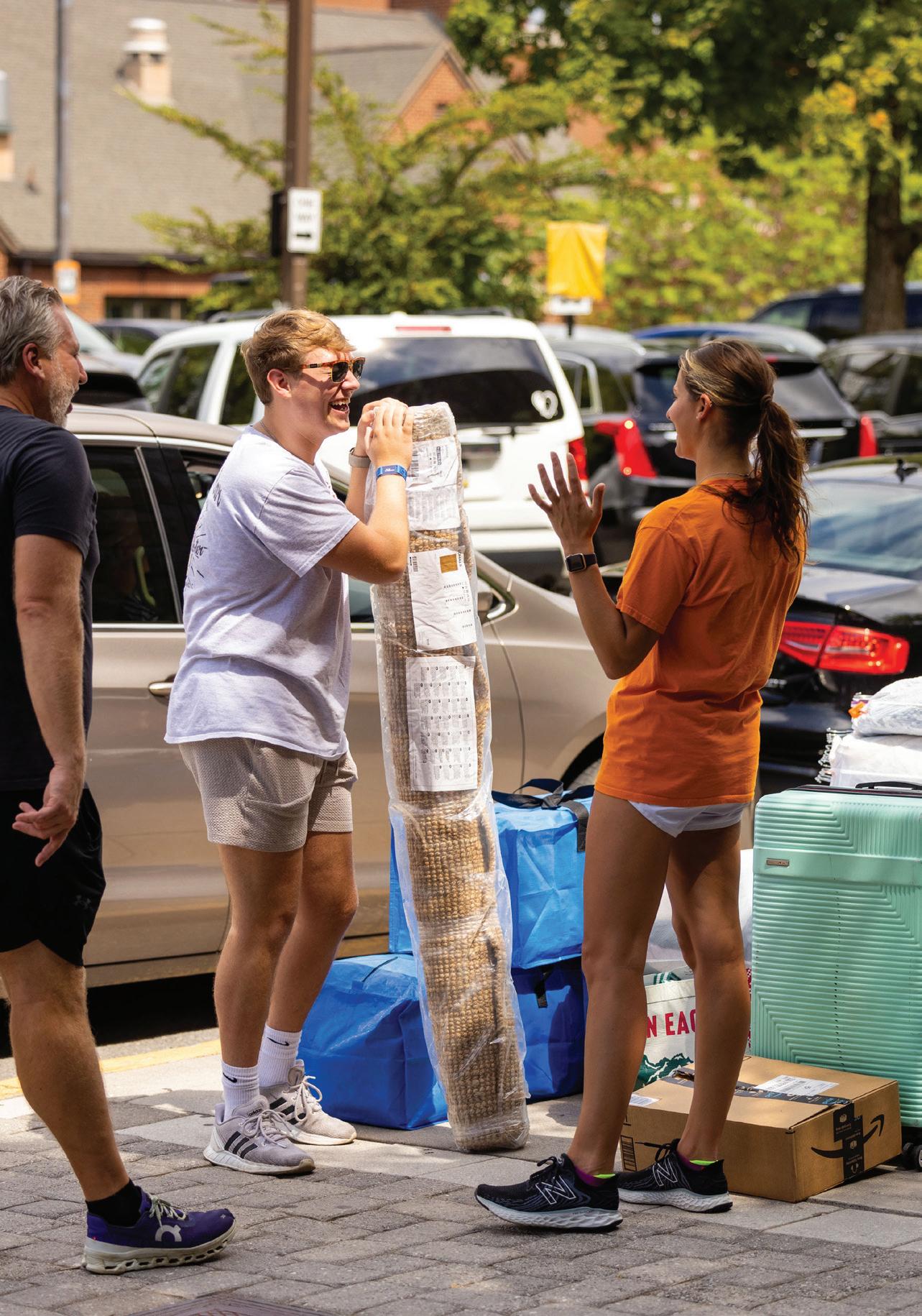
70 faculty and staff volunteers from across campus, including senior administrators from the Chancellor’s cabinet
90% of respondents were satisfied or very satisfied with the check-in process
84% of respondents were satisfied or very satisfied with the process for dropping off their belongings
89% of respondents were satisfied or very satisfied with their interactions with hall staff at check-in
Anthony White, executive director of University Housing, and Myrick both noted how having more involvement from campus partners and having a successful move-in is a win for our whole campus. Partners from across campus had the opportunity to meet with the students who would be sitting in their classrooms, joining their organizations, attending their events, and were able to make a lasting first impression.
Homecoming
Homecoming is a decades-old tradition on UT’s campus, dating back to 1916. Each year offers a new opportunity to involve the campus community. Over the years, Homecoming celebrations have included student competitions, a parade, and many other events in addition to the end-of-the-week football game.
In years prior, staff in the Center for Student Engagement in Student Life and Multicultural Student Life were the


40
primary organizers and planners for Homecoming events. Following Homecoming 2021, the staff saw the opportunity to expand the ownership of Homecoming across campus.
“We wanted to cast a wider net of input from our campus partners, so we started hosting Lunch and Learns meetings in April and May 2021 to plan for this fall,” said Ashleigh Moyer, director of the Center for Student Engagement.
“We had a chance to take planning and campus involvement to the next level. We were able to take feedback from those planning sessions and plan new events for this year.”
Overall, there were 45 events during the week of Homecoming, and 2022 saw a 215% increase in student organization and department event registration. Host offices for the events included Student Life, Athletics, Alumni, the Chancellor’s Office, Multicultural Student Life, the Jones Center for Leadership and Service, the Division of Diversity and Engagement, the School of Music, and the College of Social Work.
“We were able to break down barriers for students and student organizations to participate in competition events with cost and the type of events we hosted,” said Moyer. While competition events have historically involved Greekletter organizations, this year saw new competition events that involved students as individuals and student organizations. In total, there were 70 organizations involved in events and competitions this year.
Moyer credits this year’s Homecoming success to the partnerships that were built. The Homecoming spirit was felt across campus, with major involvement from departments, staff, faculty, students, alumni, and the community.



70 organizations

45 events during Homecoming 2022 week
215%

PRIORITY 4
increase in student organization and department event registration in 2022
41
involved in events and competitions in 2022
COMMUNITY HEALTH TEAM TO PROVIDE PROACTIVE EDUCATION
The Student Health Center has established the Community Health Team, focused on providing proactive education around illness on campus, vaccines, and how to get students the help and support they need when they’re sick.
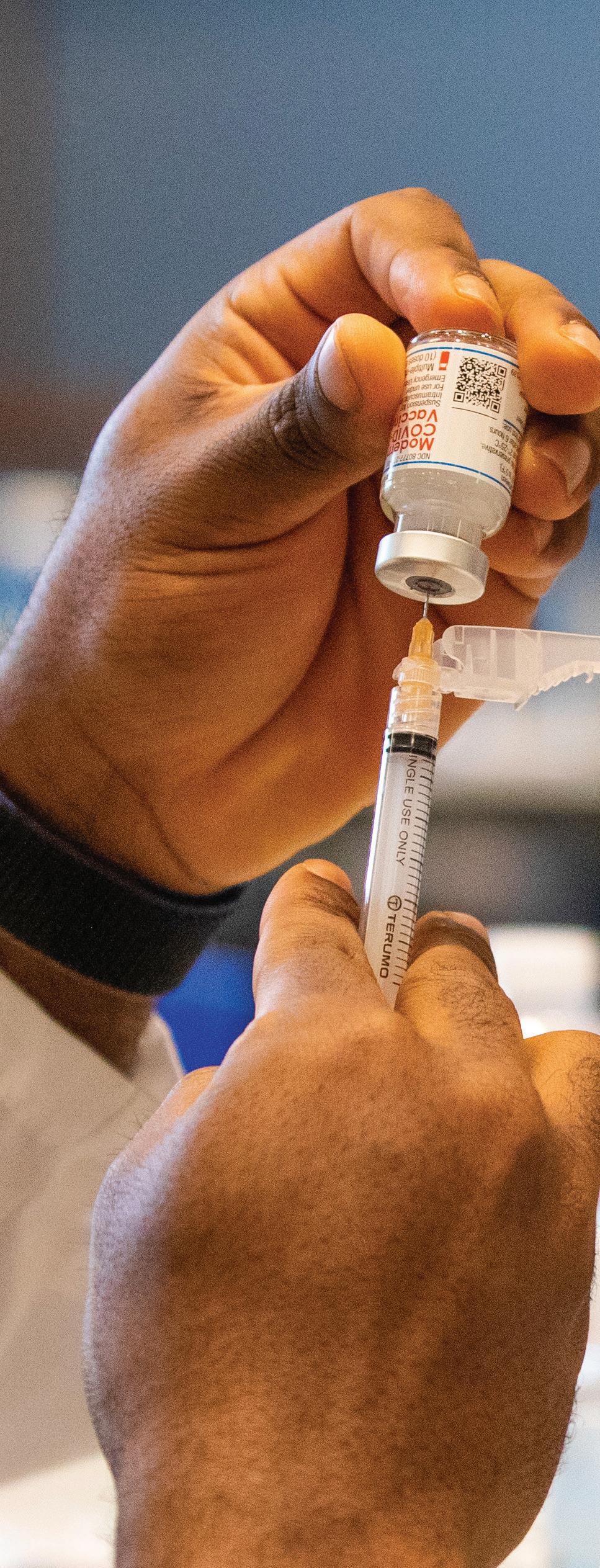
“We built upon our lessons from COVID-19 as we returned to campus and the world in a fuller way,” said Carman North, Community Health Team member. “Our mission is to understand how illness moves through the community and provide informed outreach as needed where community transmission is occurring.”
The team will also oversee vaccine education and was recently awarded a $300,000 grant from the Tennessee Department of Health to implement educational programming and communication surrounding vaccines. The staff is currently hosting vaccine clinics for the flu and for the Moderna booster for COVID-19 but hopes to form a group of student champions to help the staff better understand the opinions on vaccines on campus.
“These students will be the student voice for our office,” said North. “They will be able to help us understand what other students’ opinions are on campus and that will help us communicate in a more effective way to students.”
In addition to proactive health education, the team will help students who are experiencing illness or injuries that would keep them from attending class. David Laubach, a fellow Community Health Team member, explained that when students first start to feel unwell is when they should start the process of working with Student Health.
“I want students to feel empowered to do the right thing and stay home when they are sick, and I want them to know support is available to them when they need to make that decision,” said Laubach. “We can help them work with their professors if they need to miss class due to illness.”
Students who may miss class due to illness can learn more about absence notifications by visiting studentlife.utk.edu/absence.
42
CENTER FOR CARE AND RESILIENCE ESTABLISHED, OVERSEES 974-HELP

A new office in the Division of Student Life oversees the care of students after they are referred by the 974-HELP line. The staff in the Center for Care and Resilience (CCR) will work with students and the university to support individuals who are experiencing some measure of distress in their lives and connect them to university and community resources.
The 947-HELP referral line helps distressed students reach their academic goals and helps maintain a safe community and learning environment for all students. Director for CCR, Lisa Loar, discussed the need for a standalone department to better serve students due to the high demand for services.

“The care and resilience department within the Dean of Students office had greatly expanded since May 2021, by adding four care coordinators, and a director, so now we are a staff of eight full-time staff members. Being a separate unit within Student Life enhances our ability to support the well-being of our student population.”
Students build a partnership with a care coordinator to create and implement a plan that supports self-advocacy, growth, and a return to a level of functioning most likely to promote success. The relationship between a student and a care coordinator is primary and essential, and care coordinators empower students to self-advocate and access resources on campus and in the community.
Located on the second floor of the Student Health Center, next to the Student Counseling Center and the Center for Health Education and Wellness (CHEW), the CCR will have more opportunities to connect students directly with those specific resources if needed.
“Our proximity to Counseling and CHEW will be a benefit for us and can lead to a transitional process,” said Madisien Howard, interim assistant director for the CCR. “If a student needs counseling services, we can easily walk them there ourselves and have a direct connection with Counseling.”
“The kinds of support that we’re providing students really align with the health and wellness units in our division,” continued Loar. “We have students in distress, and we want to create a space for them to feel comfortable enough to share what they need to about what’s going on in their lives. We look forward to building more inclusive spaces where students can be their authentic selves who they are and feel included and important.”
In addition to a space that is more conducive to those possibly challenging conversations, the staff in the CCR have also developed a specific space in the center to help students experiencing distress. The respite space is intentionally designed to help students who are in distress and includes bean bag chairs as well as trauma-informed lighting to help relax the students.

PRIORITY 4
43
STUDENT DISABILITY SERVICES: PROVIDING STUDENTS WITH RESOURCES TO SUCCEED
Student Disability Services (SDS) within the Division of Student Life provides an accessible university experience for students with disabilities. The staff members work with students to create an individualized plan to break down barriers and help students meet their academic, professional, and personal goals while at UT.
SDS offers a variety of services such as note taking, testing accommodations, sign language interpreting and transcribing, accessible media services, housing accommodations, and more. In addition to helping students get accommodations, the office also works with the university to educate the community on barriers to access and ways to make programs, events, and classes more accessible to students with disabilities. The staff will regularly share information and updates regarding ADA compliance and how the campus can improve accessibility.
One of the main reasons
Madison Allen, a senior majoring in nuclear engineering, chose to attend UT is because of her experience with the SDS office. She notes that the office and the staff have been instrumental in her success at UT and have been very welcoming and personable to work with.

“My experience with the staff in SDS has always been excellent,” said Allen. “They all have become my big orange family here on campus.”
Similarly to Allen, senior business major Nathan Hethcox also explains how the staff in SDS helped him to get the support he needed to succeed from the very first interaction he had with their office coming into UT as a first-year student.

“The very first intake meeting with them was very detailed and helpful,” said Hethcox.
“From the start, it’s a very individualized approach. SDS listened to our concerns and helped us develop a plan for success. It made me feel more at peace.”
Scholarships
In addition to providing students with resources and accommodations, SDS also has several scholarships available to students who utilize the services provided by the office. There are currently two scholarships available: the Robert L. and Helen Johnson Scholarship, which is awarded to one student, and the Students with Visual Disability Scholarship, which is awarded to three students. Additionally, the UT Haslam College of Business has a scholarship for students with learning disabilities that students may also apply for.
David Ndiaye, director of Student Disability Services, believes that scholarships offer a unique opportunity to celebrate student success. “The SDS scholarships afford us the opportunity to recognize students’ academic achievements and perseverance while providing a financial assistance that is often much needed,” said Ndiaye. Student Disability Services awarded $6,500 in scholarships in the 2021-2022 academic year.
Allen was a recipient of a 2020 scholarship from SDS, noting that receiving the $1,500 scholarship provided her with the support and assistance she needed in order to pursue her career goals as a student with a disability. She was recognized as the 2020 Students with Visual Disability
 Madison Allen
Nathan Hethcox
Madison Allen
Nathan Hethcox
44
Madison Allen and her parents attend the 2022 SDS Awards Banquet
Scholarship recipient at the SDS Awards Banquet early that year and served as the keynote speaker for the 2022 SDS Annual Awards Banquet two years later.
Peer Mentor Program

Creating connections and building community is critical for students and their success. Several offices within Student Life utilize a peer mentoring program to connect new students to current students to help them navigate campus and life at college.
The peer mentoring program in SDS helps firstyear students become knowledgeable about and comfortable with the campus, SDS, and college life in general by pairing them with a returning student who is also registered with SDS.
Both Hethcox and Allen participated in the SDS Peer Mentor Program and indicated how meaningful this experience was to them. They both expressed how they wanted to provide new students with guidance and support during their first year.
“It’s a rewarding experience,” said Hethcox. “I wanted to be able to help students who were in my shoes and be a friend to students on campus. I’ve had four years of experience with SDS and I want to help them understand it quickly.”
Student Advisory Board
REFLECTIONS FROM SDS PEER MENTORS
“I was surprised at how much guidance I could give [my mentee]. I learned how far I have truly come since my freshman year.”
—SDS Peer Mentor
To hold themselves accountable and improve the services they provide to students, SDS works with a Student Advisory Board (SAB). Established in the fall of 2020, the SAB has been instrumental to SDS in obtaining feedback from students about their experiences on campus. One piece of feedback received was related to faculty training and ensuring a resource is available to instructors to learn about SDS and the services provided. An asynchronous faculty course on Canvas was developed in collaboration with the SAB and the Faculty Advisory Board.

“I believe my listening skills and empathy are both good traits that will help me communicate and build healthy relationships with people in the future.”
—SDS Peer Mentor
“I feel that my communication skills got much better through this program.”
—SDS Peer Mentor
The SDS Student Advisory Board was established as a critical partner in reviewing proposed modifications to help ensure that SDS is doing what is in the best interest of students while following university policy and legal requirements.
“I’ve served as an SDS student advisory board member for two years,” said Allen. “I am able to give advice and insight from a student perspective on ways SDS can improve and modify their services to create a more accessible experience for all students at UT.”
PRIORITY 4
45
STUDENT LIFE THROUGH THE LENS: 2022–2023

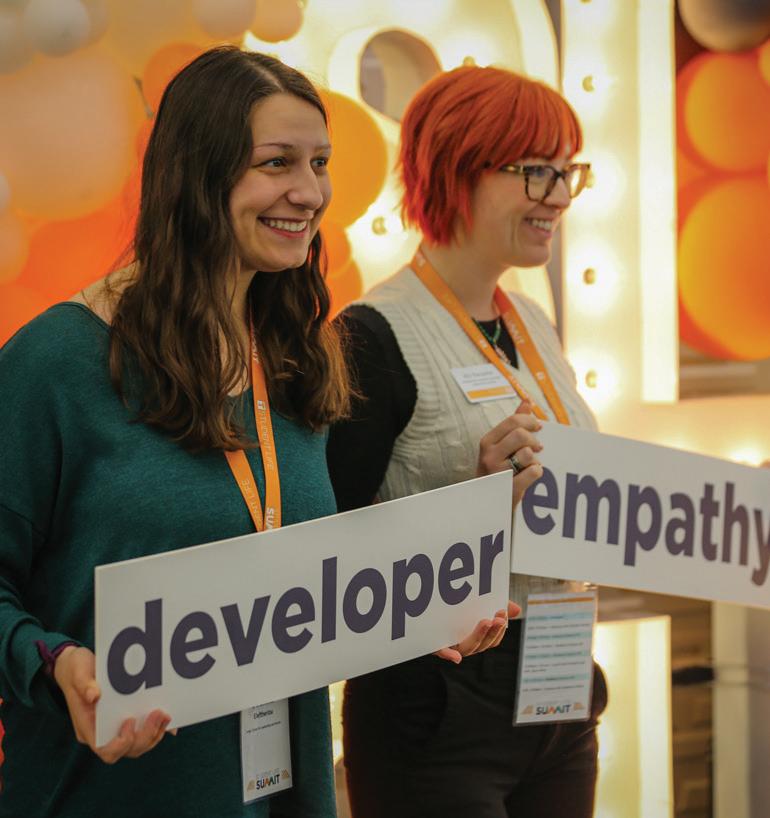


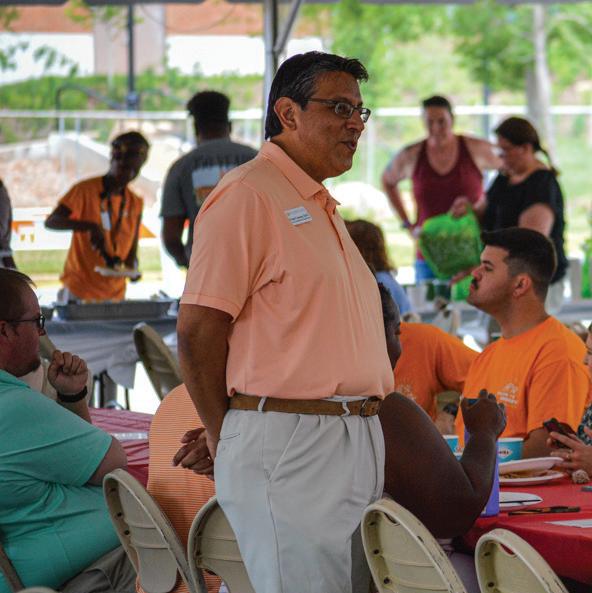



 photos by Laurenz Howard, Student Life Communications Intern
photos by Laurenz Howard, Student Life Communications Intern

46





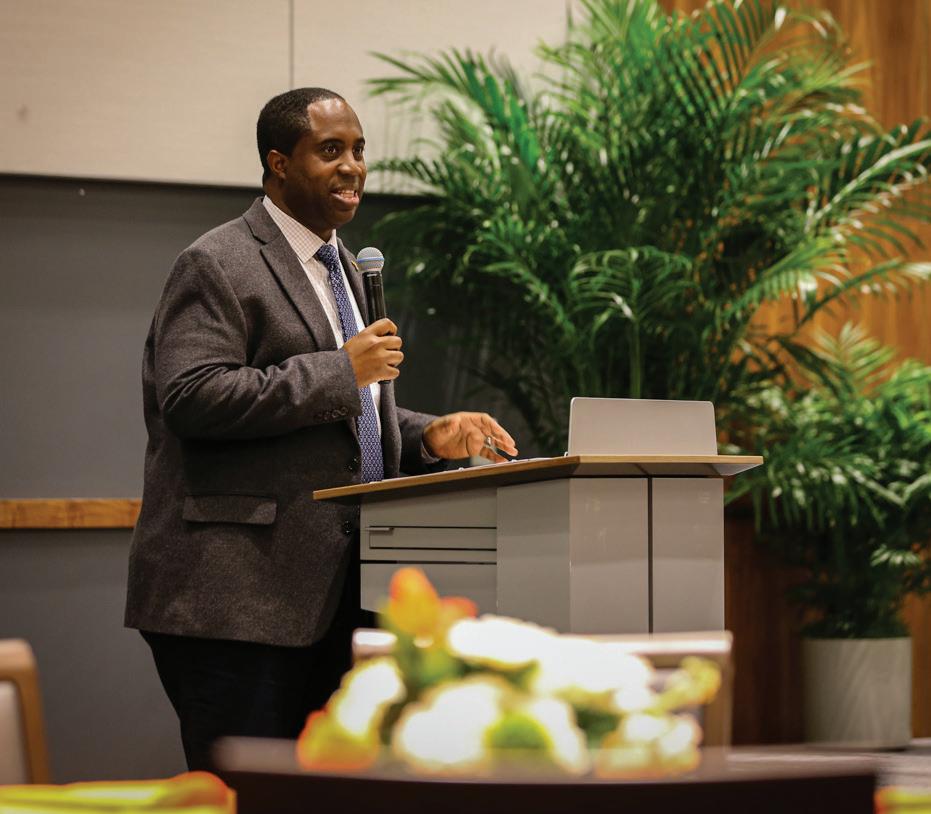



47
BY THE NUMBERS STUDENT LIFE
Our impact on the student affairs profession





48
10 Student Life staff members holding
14 leadership roles in 8

PROFESSIONAL
Association
Association
Association


Tennessee
NIRSA
Southeastern
of Fraternity/Sorority Advisors
of Public and Land-Grant Universities
of College Unions International
Intramural and Recreational Sports Association
Championship Series
Association of Housing Officers Foundation Board Member Council on Student Affairs Programming Committee Regional Director Regional Director Convener 2023 Regional Conference Coordinator Volunteer Development Team Member Board of Trustees Member 2024 Annual Conference Planning Team 2023 Annual Conference Planning Committee Soccer National Tournament Experience and Logistics Member Sage, Executive Board Archivist JDEI Climate Study Implementation Team Soccer Work Team Chair
professional associations
LEADERSHIP IN PROFESSIONAL ASSOCIATIONS
STUDENT LIFE STAFF SERVED IN THE FOLLOWING LEADERSHIP ROLES IN 2022-2023
ASSOCIATIONS INCLUDE: 49
2022 PROFESSIONAL PRESENTATIONS
Student Life represented the university in locales such as Chicago, IL; Baltimore, MD; Atlanta, GA; Asheville, NC; Minneapolis, MN; Orlando, FL; and many more!
22 Student Life presenters
18 higher ed conferences
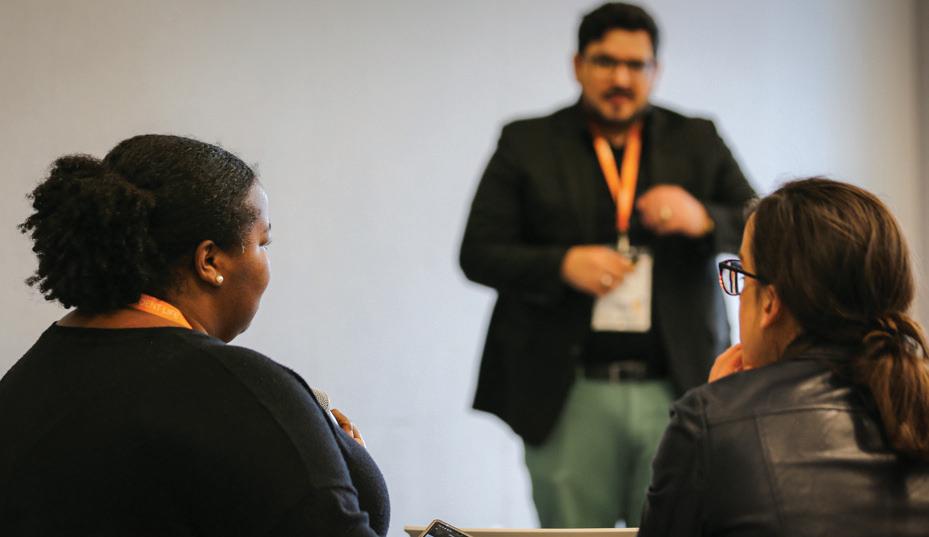
9 states
CONFERENCES PRESENTED AT INCLUDE:
2022 Assessment Institute
NASPA Conference on Student Success in Higher Education
Assessment 360 at the University of Maryland
Association of Fraternity & Sorority Advisors
NASPA Region IV West & East Conference
TN NAME (National Association for Multicultural Education) Conference
TN CBFO (Culturally Based Fraternal Organizations) Consortium
ACUI Annual Conference 2022
ACUI Region III Conference 2022
ACUI Region III Conference 2023
2022 SACSA Annual Conference with NASPA Region III
2022 America Outdoors Conference and Outfitter Expo
2022 NIRSA Intramural & Sport Club Virtual Institute
2022 TIRSA State Workshop
2022 TACUHO (Tennessee Association of College & University Housing Officers)
2022 SEAHO Annual Conference
2022 eRezLife User Conference
2022 NASPA Annual Conference
50
ADDITIONAL SERVICE TO THE FIELD
6 staff members
5 types of service
8 peer institutions/conferences


SERCVICES PERFORMED
External Reviewer
Reviewer & Content Matter Expert Faculty Member
Program Review Team for NASPA National Conference
Review Committee for Residential/Non-Residential Communities

PUBLICATIONS & AWARDS
2 staff members published in 2022
11 staff members or offices received awards
Brooklyn Barnes | Outstanding Undergraduate Student | Association of College Unions International Region III
Melissa Brown, Noelia Pacheco Diaz | 2022 Catalyst Award for Assessment and Institutional Effectiveness | Anthology
Hunter Carlheim | Outstanding IFC Advisor | North American Interfraternity Conference
Ian Crone | ACUI Values Award | Association of College Unions International
Carlos Diaz | Jr. Flag Football International Cup Official Selection | USA Football
María Martinez | Volunteer 40 Under 40 Award | The University of Tennessee, Knoxville
Shaun McComas | BSSW Field Instructor of the Year | UTK College of Social Work
OSFL Prevention Team | AFA award for Outstanding Change Initiative | Association of Fraternity/Sorority Advisors
Anthony Prewitt | Impact Leader Award | The National Society of Leadership and Success
Anthony Prewitt | Black Alumni Council Excellence Award | UTM Black Alumni Council
Anthony White | 2023 Outstanding Mentor to New Professionals | ACPA College Student Educators International
Student Life by the numbers reflects 2022 data submitted by the Student Life leadership team 51
Frank Cuevas, Kayley McMahan
2023 STUDENT LIFE STAFF AWARDS
Each year the Division of Student Life recognizes select staff members and campus partners for excellence in their fields and transformational impact on the student experience. This year, the awards celebration was held on Friday, May 19, 2023, on the UT Knoxville campus.
Award winners were nominated by colleagues and determined by two Student Life committees: the Staff Engagement and Development Committee and the Inclusive Excellence Committee.
INNOVATIVE PROGRAM OF THE YEAR
VolsGrow Program
Student Conduct and Community Standards
NEW STAFF MEMBER OF THE YEAR
Natalie Frankel
Jones Center for Leadership and Service
STAFF MEMBER OF THE YEAR
David Ndiaye
Student Disability Services
SERVICE EXCELLENCE AWARD
Donna Mount
Center for Student Engagement
UNSUNG HERO AWARD
Amanda Samsel
Student Conduct and Community Standards
LIFETIME ACHIEVEMENT AWARD
Karen Buchanan
Student Union
GRADUATE STUDENT OF THE YEAR
Kenzie Harville
Office of Sorority and Fraternity Life
FRIEND OF THE DIVISION AWARD
Amy Williams
UT Foundation
COLLABORATIVE PROGRAM OF THE YEAR
Vols Walk for Sexual Assault Awareness Month
Center for Health, Education and Wellness and the Office of Title IX
COMMUNITY SERVICE AWARD
Lindsay Davis
Office of the Dean of Students
COMMITMENT TO DIVERSITY AND INCLUSION AWARD
Hannah Stewart RecSports
52
THANK YOU 53
700 Andy Holt Tower, Knoxville, TN 37996 | studentlife@utk.edu | studentlife.utk.edu 54





 Frank Cuevas vice chancellor for Student Life
Frank Cuevas vice chancellor for Student Life
 Jill Zambito assistant vice chancellor for health and well-being
Jill Zambito assistant vice chancellor for health and well-being












 by Susannah Marshman, assistant vice chancellor for leadership and engagement
by Susannah Marshman, assistant vice chancellor for leadership and engagement










































 by Byron Hughes, assistant vice chancellor and dean of students
by Byron Hughes, assistant vice chancellor and dean of students




















































 Madison Allen
Nathan Hethcox
Madison Allen
Nathan Hethcox










 photos by Laurenz Howard, Student Life Communications Intern
photos by Laurenz Howard, Student Life Communications Intern





















